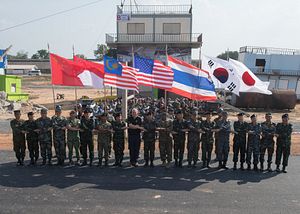This week, the United States and Thailand will kick off the 2019 iteration of the annual Cobra Gold exercises – an engagement that began as a bilateral drill between the two allies and has now grown into Asia’s largest multinational drill. While the exercise may first and foremost be a showcase of the growing multilateralization of a defense engagement, it will also be watched for what it says about the state of the U.S.-Thailand alliance amid broader domestic and foreign policy developments for both sides.
As I have noted before in these pages, 2019 represents a key year for the management of the U.S.-Thailand alliance amid the confluence of broader internal and external trends. The alliance, forged in the midst of the Cold War, has faced some challenges of late, with the most recent period witnessing a chill after the May 2014 coup and Bangkok’s growing ties with China, with strains continuing on even after a period of recalibration under the late Obama administration and the Trump administration. This year will be a key test of how both sides are managing the alliance amid a series of developments, including uncertainties around Thailand’s expected election in Washington and concern about the evolution of the Trump administration’s Asia policy in Bangkok (See: “Strengthening the US-Thailand Alliance for an Indo-Pacific Future”).
This week, the alliance will be in focus again with the holding of the 2019 iteration of the Cobra Gold military exercises. Though aspects of the exercise, such as civic assistance projects, have already been ongoing, some of the military aspects of the 38th iteration of the exercise series which grab the most headlines will take place starting February 12 for about two weeks.
Per the U.S. military, Cobra Gold 2019 will be held from February 12 to February 23 with up to 29 countries participating, including several Southeast Asian nations such as Indonesia, Malaysia, and Singapore (though, notably, the levels of participation of these countries, an arguably more important metric, will be different). The exercise will involve a series of interactions including a staff exercise, humanitarian civic assistance projects, and a field training exercise, and around 4,500 U.S. personnel will be directly participating both ashore and afloat according to the U.S. embassy in Thailand.
As the exercise itself gets underway, as with previous years, there will be significant media focus and speculation on aspects of the drills itself. This includes the level of U.S. personnel involvement relative to previous years as well as the publicized focus areas. Thus far, not much in the way of specifics has been issued beyond the usual statements before the exercises begin.
Beyond the exercise itself, the spotlight will continue to be on the state of the broader alliance relationship into 2019. While work continues to occur at the working level amid broader trends, including the continued rollout of the U.S. Free and Open Indo-Pacific Strategy (FOIP) and Thailand’s chairmanship of ASEAN, both Thailand and the United States are facing a year of domestic preoccupation with Thailand set to hold an election and an official coronation of its new king Maha Vajiralongkorn and the United States essentially headed closer to campaign mode ahead of elections set for November 2020. In a reflection of this domestic preoccupation, it is notable that we have seen much less coverage on Cobra Gold in the lead up to the exercise than we have typically seen over the past few years.
How both sides will contend with this balance will be interesting to watch not just through the exercise itself in the next few weeks, but through 2019 more generally. As I have observed before, aspects of this will continue to play out during the year, including the evolution of broader issues such as the growing U.S.-China competition as well as more specific developments such as whether U.S. President Donald Trump will be able to attend the East Asia Summit scheduled to be held in Thailand later this year as part of Thailand’s ASEAN chairmanship (Trump had attended it in 2017 in the Philippines but skipped it in 2018). It is these alliance management questions, rather than the specifics of how Cobra Gold 2019 plays out, that ought to be the focus to assess how Washington and Bangkok are faring on this count.

































